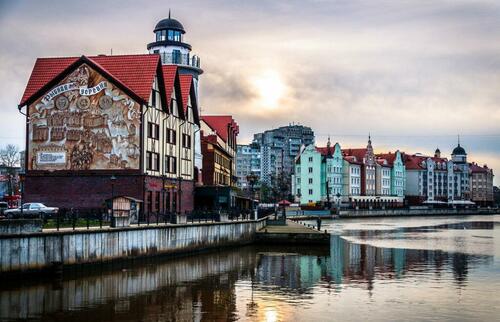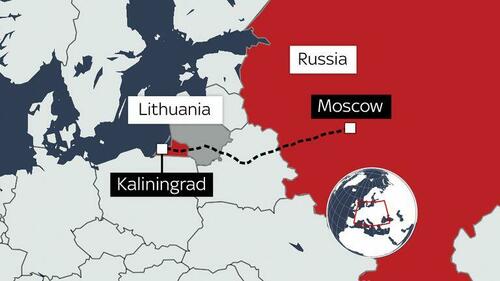
It seems that saner minds are prevailing after ratcheting rhetoric coming from Moscow threateningly elevated Lithuania's effective blockade of all overland trade and goods to an 'act of war' by the West... as the European Union is now refusing to back the full extent of Lithuania's sanctions enforcement measures.
The European Commission issued its legal guidance on the standoff Wednesday, which had over the past month resulted in some one million Russian citizens in the exclave remaining cut off from products brought by rail and road. "The transit of sanctioned goods by road with Russian operators is not allowed under the EU measures. No such similar prohibition exists for rail transport," the European Union executive said, specifying that Russian goods should continue to be allowed by train.
"The Commission underlines the importance of monitoring the two-way trade flows between Russia and Kaliningrad … to ensure that sanctioned goods cannot enter the EU customs territory," it added, emphasizing further that the rail exception doesn't apply to weapons or munitions. The ban on transit still exits for freight brought by road, however. The EU said further this should be done through "targeted, proportionate and effective controls and other appropriate measures."
There was the additional caveat to the ruling that EU trade sanctions would not apply as long as Russia's transport volumes do not exceed averages of the last three years, according to the "the real demand for essential goods at the destination." It remains that food and humanitarian goods were reportedly never subject to the sanctions, nor was travel of citizens back-and-forth.
Lithuania’s government soon after the EU legal advice was issued said that it would adhere to it, albeit perhaps grudgingly:
Lithuanian Foreign Ministry said on Wednesday the previous trade rules, which blocked many sanctioned cargos from transport between mainland Russia and Kaliningrad, were "more acceptable".
"Kaliningrad transit rules may create an unjustified impression that the transatlantic community is softening its position and sanctions policy towards Russia", the statement said.
On Monday Russian President Vladimir Putin and his Belarusian counterpart Alexander Lukashenko during a phone call agreed to a "possible joint response" to the blockade of transit to Kaliningrad by Lithuania.

Without elaborating on details, but sounding ominous given threat of near future action, a Kremlin statement said of the call, "Emphasis was placed on the situation relating to the illegal restrictions imposed by Lithuania on the transit of goods to the Kaliningrad Region. In this context, some possible joint steps were discussed."
Moscow's position has vehemently remained that Lithuania's actions amounted to an "illegal blockade". The hardline, unflinching position of Lithuania without doubt created a major unwanted headache for EU leadership.
The EU must’ve really freaked out about the potential consequences of the Kaliningrad blockade. Having a tiny member, Lithuania, antagonizing BOTH China and Russia, seems to be more trouble than it’s worth. https://t.co/oJ7dKcQp0H
— Nina 🐙 Byzantina (@NinaByzantina) July 13, 2022
After Brussels' guidance was released, EU spokesman Eric Mamer stressed, "We did not negotiate anything with Russia." The Kremlin did, however, previously submit its grievances to European authorities, demanding that they act to overturn Lithuania's policy.
It seems that saner minds are prevailing after ratcheting rhetoric coming from Moscow threateningly elevated Lithuania’s effective blockade of all overland trade and goods to an ‘act of war’ by the West… as the European Union is now refusing to back the full extent of Lithuania’s sanctions enforcement measures.
The European Commission issued its legal guidance on the standoff Wednesday, which had over the past month resulted in some one million Russian citizens in the exclave remaining cut off from products brought by rail and road. “The transit of sanctioned goods by road with Russian operators is not allowed under the EU measures. No such similar prohibition exists for rail transport,” the European Union executive said, specifying that Russian goods should continue to be allowed by train.
“The Commission underlines the importance of monitoring the two-way trade flows between Russia and Kaliningrad … to ensure that sanctioned goods cannot enter the EU customs territory,” it added, emphasizing further that the rail exception doesn’t apply to weapons or munitions. The ban on transit still exits for freight brought by road, however. The EU said further this should be done through “targeted, proportionate and effective controls and other appropriate measures.”
There was the additional caveat to the ruling that EU trade sanctions would not apply as long as Russia’s transport volumes do not exceed averages of the last three years, according to the “the real demand for essential goods at the destination.” It remains that food and humanitarian goods were reportedly never subject to the sanctions, nor was travel of citizens back-and-forth.
Lithuania’s government soon after the EU legal advice was issued said that it would adhere to it, albeit perhaps grudgingly:
Lithuanian Foreign Ministry said on Wednesday the previous trade rules, which blocked many sanctioned cargos from transport between mainland Russia and Kaliningrad, were “more acceptable”.
“Kaliningrad transit rules may create an unjustified impression that the transatlantic community is softening its position and sanctions policy towards Russia“, the statement said.
On Monday Russian President Vladimir Putin and his Belarusian counterpart Alexander Lukashenko during a phone call agreed to a “possible joint response” to the blockade of transit to Kaliningrad by Lithuania.

Without elaborating on details, but sounding ominous given threat of near future action, a Kremlin statement said of the call, “Emphasis was placed on the situation relating to the illegal restrictions imposed by Lithuania on the transit of goods to the Kaliningrad Region. In this context, some possible joint steps were discussed.”
Moscow’s position has vehemently remained that Lithuania’s actions amounted to an “illegal blockade”. The hardline, unflinching position of Lithuania without doubt created a major unwanted headache for EU leadership.
The EU must’ve really freaked out about the potential consequences of the Kaliningrad blockade. Having a tiny member, Lithuania, antagonizing BOTH China and Russia, seems to be more trouble than it’s worth. https://t.co/oJ7dKcQp0H
— Nina 🐙 Byzantina (@NinaByzantina) July 13, 2022
After Brussels’ guidance was released, EU spokesman Eric Mamer stressed, “We did not negotiate anything with Russia.” The Kremlin did, however, previously submit its grievances to European authorities, demanding that they act to overturn Lithuania’s policy.






